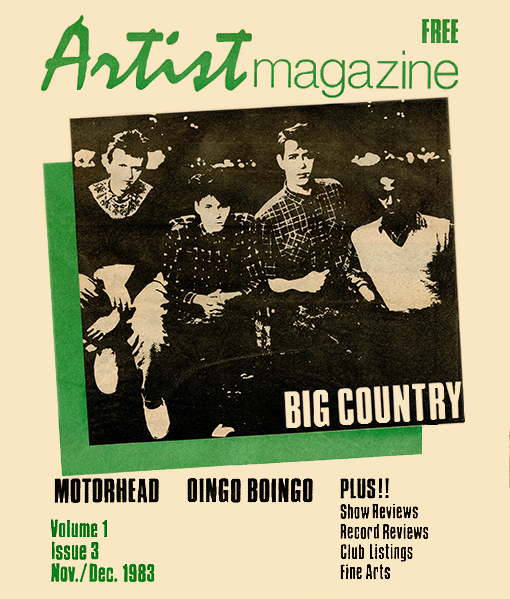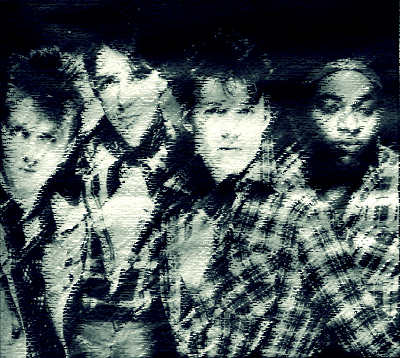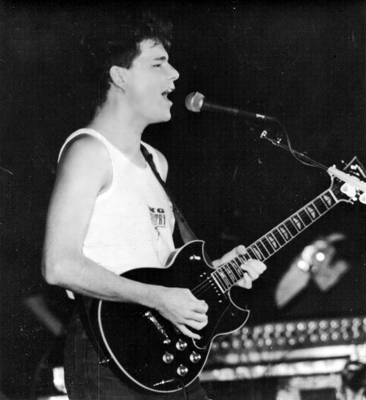
|
Search JoyZine with Google Site Search! |
Big Country Interview by Joy Williams
The music is put forth by four young men, all in their mid-twenties, who have a long and honorable history in the British music scene. There music is simultaneously wild and free and precisely rhythmic. Stuart Adamson and Bruce Watson provide the earthly romantic lyrics and the spacey, ringing, marvelously melodic interlocking guitar sounds, while Mark Brzezicki and Tony Butler provide the rock-solid rhythmic underpinning. I met the band at their hotel in San Francisco shortly before they were to play two shows at Wolfgang's, where Mark filled us in on his background and the inception of Big Country. I'm 26 now and I started when I was sixteen. Actually, from about the age of ten on, I found myself tapping things, annoying my mum—fidgeting and tapping and banging knives and forks, though not necessarily in rhythm. The very look of a drum kit always made me feel excited towards music. Passing a music shop, I think, was when I really got into it. Drum kits are like airplanes, and I love airplanes as well. They both excite me because both are unobtainable—you know, you always see an airplane in the sky and you can't touch it. It's like that with the drum kit. You only see them in pictures. Everyone's got a guitar, but nobody I knew back then had a drum kit. And when I saw it, well, I don't want to be romantic about it, but it's just the feeling I got when I started.
Then my friend down the road bought a drum kit. I was really terrible, not a real kit, more like a junior, with an old bass drum, one tom and a snare. But when he bought that, I found I was going around to his house, knocking on his door, not so much to see if he was in, but to see if the drum kit was there!That's how I started and I ended up buying my first drum kit off him from my paper route money, which was about a pound a week. Then I came to a point in my life where you're looking for a career. You leave school, you pass your examinations (hopefully)—which I did do—and I following in my dad's footsteps. I became an aircraft mechanic. I was to do an apprenticeship under British Aerospace as an aircraft fitter, but at the same time I was playing my drums in the evening with different show bands that I won't bother to name because I went through about fifteen of them. I did pubs, cabarets, workingmen's clubs, ex-servicemen's clubs—I did the lot. I've played nearly every club in London or any club within a fifty-mile radius of London that's ever had music in it. I've played with most of the musicians within a ten-mile area of where I live, as well. During that period of time, I found myself working with musicians who were a lot better than me. I was 16, 17 and found myself working with 32-year-olds. What I was actually doing was playing other people's songs, cover versions, which is good training as far as I'm concerned. That's why I did it. But the standard of musicians I was playing with was quite high. Anyhow, I found myself working in different studios around '75 and '76, where the group I was working with was doing cover versions, and I would moan and say, "why don't we do our other songs?" And the others would say, "Yes, why don't we?" So you get into a situation where you go into a cheap demo studio that doesn't cost much, and doing a song and see what it sounds like. And you're always really impressed with it when you hear it, until you hear it recorded, and then you think, "My God, that's awful." I went through a spell of doing that, but the good thing was I got to know a lot of studios and I got a lot of session work. The way I did that was by not charging the standard musician's union rate, which was quit high at the time. I shouldn't have done it, really, but I wasn't in the union then.
I decided to go to lots of auditions for other bands that would be advertised in the back of Melody Maker, and I don't want to be big-headed, but I got most of the auditions I went to. I didn't choose any of them, though, because none of them inspired me. But that's the way I got my name known to the world. And then I rang up one ad number and who was to answer it but Tony, our bass player. The ad was for a Phil Collins-style drummer, so I told him I was. I was always into musicianship-type players. I missed the punk thing completely, I didn't relate to punk at all because, for me, they were bad musicians. But I missed out on the spirit of the music. I was so technically minded then, into Billy Cobham, jazz, Phil Collins. I was into being a session musician. What happened was, I went to the audition after ringing Tony Butler up, and the name of the group was The Simon Townshend Band. It was a really, really technically minded group. We sounded a lot like Yes and a lot like Genesis and Peter Gabriel and The Who all rolled into one. Simon, who is incredibly talented, was the keyboard player, and we worked together from when I was about 18 to 25. We went through various different forms, got rid of some musicians, and wound up with three of them—Simon, Tony Butler and me—and we called ourselves On the Air. We got a record deal with Warner Brothers, and two badly produced singles were released. Nothing happened. We worked really well together, the three of us, but a bad thing happened. We were starting to get compared to The Jam because The Jam were a three-piece and we were playing power pop like The Jam were—the aggressive guitar, single bass and drums—but as far as I'm concerned, Simon Townshend's got more right to sound like Peter Townshend [his brother] than Paul Weller ever did. But for Simon it was also like living under Pete's shadow, and he would have nothing to do with Pete at all. He wouldn't take Pete's help—Pete would offer him the P.A. or recording facilities. During that time, when Pete was interested in keeping an eye on him [Simon], he quite liked what me and Tony were doing as well. Since Simon was still living at home, I'd be around Pete's mum and dad's house quite a lot, and one day Pete rung up. "Who's that," he said, and I said, "It's Mark." "Oh, hullo, Mark. What are you doing tomorrow?" I said, "Nothing. We're gigging Saturday somewhere that's not worth talking about but..." He said, "Why don't you come down to the studio, Wessex Studio in London, and play a couple of tracks on my new album." And I said, "Oh, great." Tony'd already been asked to play bass and the drummer who was [playing drums] already was Simon Phillips, a big session drummer. So I went down and played two tracks on Empty Glass. Next, during this period I was doing a lot of session work for a lot of stupid people, names you never hear of. But I also auditioned for Judy Zoo and got asked to play with her but I didn't because I hadn't finished my aircraft apprenticeship. I'd worked five years for my apprenticeship and I wasn't going to leave it for music, when I'd had offers from other people. I worked with Daryl Way from Curved Air, did an album with Roger Daltry—my life during that period was just working with everyone I could think of. It was a challenge. I was always a lot younger than the people I felt I could play like. What I had over a lot of drummers my age was that my whole record collection was... I've got hardly any British bands in it at all, and I find that the Americans are the best musicians, technically, whereas the British have got a mixture of good musicianship and... When you're not a good musician there's one side of you that can become good if it becomes fashionable to be not good, to play slightly out of tune, have the right color hair. And then you get credited with such things as, "But what character in his playing." If you take it logically as a musician, my idea of musicianship means of the highest degree. And I've still got a hell of a long way to go, that's why I still look up to people like Billy Cobham and Simon Phillips and Steven Gadd, who I find a hundred billion times better than me. And when I hear them, I want to give up! But I've got this burning drive to play my drums. If I don't play with Big Country, I'll be playing with somebody else. I fit into Big Country, and I'm very fussy about who I play with. When I say "play with," I'll play with anyone and I still do 'cause when I'm with Big Country I'm still doing session work. But as to committing myself and time and artistic involvement, then I'm really fussy who I put that input with because I've got to get the same from the other musicians to stimulate me as I hopefully stimulate them. But back to my story. After On the Air broke up—Simon started to get into a psychedelic thing, which was good, but it wasn't suiting me and Tony. And then, I don't know, just felt like the spirit of the group went out. So me and Tony decided to branch out and go totally as session musicians. And that really excited me after that period. I thought, "Well, here I am, young, I've got a good reputation, I'm already doing session work." So we formed a company, Rhythm for Hire. "If you need a young rhythm section with experience, just dial such and such.' And there we'd go in my transit van. Pete Townshend rung us up again and said, "I want you on my new album, All the Best Cowboys Have Chinese Eyes." We did eight tracks on that. Then we were doing too many sessions, we were sick of it. It wasn't fulfilling unless it was a big name. I was looking more for a direction, and it was starting to get like work, which I never thought it would. So we carried on with the session work, but we said, "Right, we'll be a bit more choosy with our session work. but at least by doing it, we'll be on the inside of things." We were usually asked to join groups, but we never took them up. Just before we'd split from On the Air, we'd managed to get on a support tour with a group called the Skids—that's the group Stuart Adamson used to play guitar for—and I loved the way Stuart played. Then one day, along came a phone call from Phonogram's studios. "We've a session for you to do with an old colleague of yours, Stuart Adamson." "Great, how is he?" "Fine, he's got some new songs and he'd like you to play on them, he's asked particularly for you two." So me and Tony went down there and there was Bruce, who was a friend of Stuart's from Scotland, and we played these three songs we've still got in our set. I got really excited about it, and Tony was really up about it, and Tony just said to me, "Well, Mark, it looks like we found a group, doesn't it?" And I said, "Yep." It sounds a bit romantic, but at the same time we realized we'd found a group. Stuart asked us to join. And within a week we signed our record contract with Phonogram. Actually, there had been a Big Country "Mark I" that failed on a support tour with Alice Cooper. It was Stuart and Bruce and a different bass player and drummer, and it just wasn't gelling. Apparently, it was a disaster. I don't know in what way but it led to them sacking the bass player and drummer. But during that period, Phonogram held tight. "Well, I'm keeping an eye on these boys. I'll stick 'em in the studio, get some session musicians in, see what they sound like with a different rhythm session." This is a way of life. I've got my teeth stuck into it and I'm enjoying it. It allows me to express myself, and when I do, people accept it. It means that the input I want to do naturally, they tend to like. When I do session work, I switch on to a certain style, but with this group I found that I could actually say, "Hey, I think I should be playing this, what do you think? Fit a line around this rhythm." And they would do that, and it feels good. We bounce off each other. It's the most creative situation other than On the Air, which I hold very close to my heart, even though what we released I don't think is ever worth releasing again. But just the way we rehearse together... In spirit, Big Country is pretty much the same as On the Air. And it's great, because I never thought when I left Simon Townshend that I would ever find anything again that would make me that happy, but I have. It's got that magic. |


